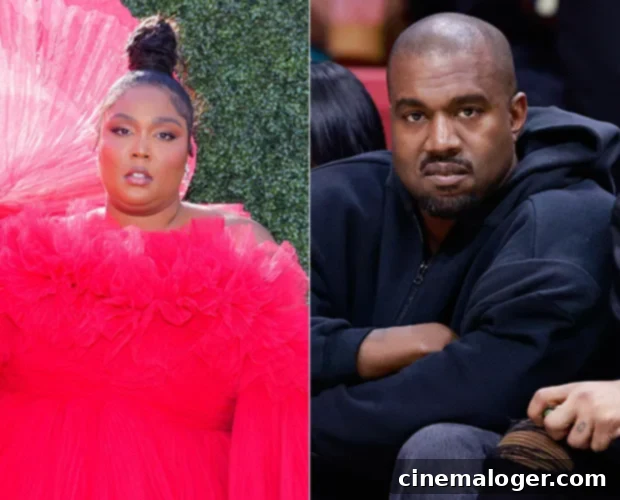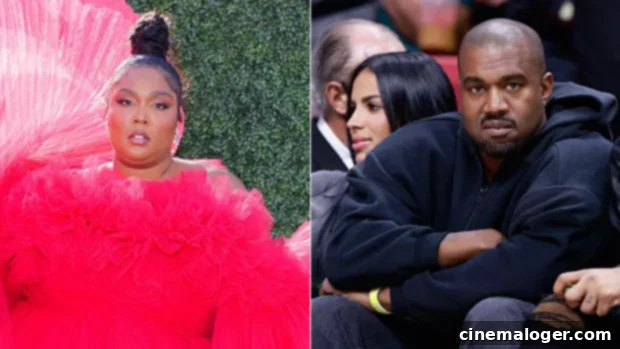Lizzo’s Powerful Response to Kanye West’s Controversial Weight Comments Amidst Public Outcry
In a moment that reverberated across social media and the entertainment world, pop superstar Lizzo delivered a poignant and unyielding message during her concert in Toronto. Her remarks came just days after rapper Kanye West made headlines with controversial statements about her weight during an interview with right-wing commentator Tucker Carlson. The “Good As Hell” singer, known globally for her anthems of self-love and body positivity, appeared to directly address West’s unsolicited comments, asserting her confidence and unwavering commitment to her authentic self, regardless of external judgment.
The incident unfolded on Friday, October 7th, during Lizzo’s electrifying performance in Canada. As snippets of Kanye West’s interview circulated online, garnering widespread criticism and debate, fans eagerly awaited Lizzo’s reaction. True to her outspoken and empowering nature, the 34-year-old artist used her expansive platform to subtly, yet definitively, shut down the negativity. A compelling video clip, shared widely by fans on Twitter, captured the powerful moment, showing Lizzo musing about escaping the drama unfolding back in the United States by seeking refuge and potential dual citizenship in Canada.
Keep Lizzo name out of y’all mouths! #Kanye #Lizzo pic.twitter.com/WBNNYB1jMq
— FMHipHop (@_FMHipHop) October 10, 2022
During a poignant break in her set, Lizzo took a moment to seemingly call out Kanye, the 45-year-old rapper, expressing what appeared to be genuine shock and understandable frustration over his public comments. “Everybody in America, got my motherf**king name in their motherf**king mouth, for no motherf**king reason,” she declared to a roaring crowd, her voice carrying both exasperation and unwavering resolve. Her subsequent statement was an anthem in itself: “I’m minding my fat black beautiful business.” This direct and unapologetic affirmation not only served as a powerful clapback to her critics but also underscored her unwavering stance on body image, personal autonomy, and self-acceptance, reinforcing the very principles she champions through her chart-topping music and inspiring public persona.
Following her pointed yet understated rebuke, Lizzo playfully delved into the idea of relocating. Expressing a mock desire to move north of the border, away from the seemingly endless stream of controversies that often plague public figures in the United States, she lightened the mood by asking the audience, “Can I stay here? Who can I marry for that dual citizenship?” The question, delivered with characteristic humor and a twinkle in her eye, served as a clever pivot, allowing her to address the discomfort and unsolicited drama without dwelling on it, before transitioning seamlessly and energetically into her next performance, leaving the crowd invigorated and supportive.
Kanye West’s Controversial Remarks and the Tucker Carlson Interview
The comments from Kanye West that directly prompted Lizzo’s spirited response were part of an extensive, wide-ranging interview with Fox News personality Tucker Carlson, 53. In a segment that quickly went viral and became a significant point of contention across social media, West, while attempting to defend his highly scrutinized “White Lives Matter” shirts, unexpectedly veered into a personal discussion about Lizzo’s body. He initially referred to Lizzo as his “good friend” before launching into unsolicited advice and criticism regarding her weight. “When Lizzo loses 10 pounds and announces it, the bots,” he explained in a clip widely shared on Twitter. “They attack her for losing weight, because the media wants to put out a perception that being overweight is the new goal, when it’s actually unhealthy.”

West continued his unsolicited commentary, delving deeper into his views on body image, health, and what he perceived as problematic media representation. His statements took a particularly harsh turn, moving beyond what he presented as health concerns to outright condemnation of media promotion of larger body types. “Let’s get aside the fact of whether it’s fashion and vogue, which it’s not, or if someone thinks it’s attractive. To each his own. It’s actually clinically unhealthy, and for people to promote that, it’s demonic,” he asserted with conviction. These remarks quickly ignited a firestorm of debate and condemnation, with many critics labeling them as blatant body shaming, insensitive, and hypocritical, especially given West’s own public image and past discussions regarding his personal health and mental well-being.
The Broader Context: Kanye’s String of Recent Controversies
Kanye West’s comments about Lizzo arrived amidst a tumultuous period of intense scrutiny and mounting controversy surrounding the prolific rapper and designer. The “White Lives Matter” slogan, which he prominently displayed on shirts at his Paris Fashion Week show, provoked widespread condemnation from civil rights activists, celebrities, and the general public. Critics vehemently argued that the phrase appropriated and severely undermined the Black Lives Matter movement, which advocates for racial justice and police accountability. This singular event alone placed West firmly in the center of a profound cultural maelstrom, drawing accusations of profound insensitivity, a fundamental misunderstanding of racial dynamics, and a provocative disregard for social justice movements.
Adding to the growing and increasingly severe list of controversies, West subsequently faced unprecedented repercussions for sharing deeply offensive Anti-Semitic messages across his social media platforms. Both Instagram and Twitter took swift and decisive action, restricting his accounts. This meant he was no longer able to post new content, comment on others’ posts, or send direct messages, and several of his most egregious and offending posts were removed entirely. These severe actions by major social media platforms underscored the gravity and seriousness of his rhetoric, highlighting a troubling pattern of behavior that crossed definitive lines from controversial commentary into outright hate speech, leading to widespread backlash and a fundamental re-evaluation of his public persona and brand by many.
Lizzo: An Icon of Body Positivity and Self-Love
Lizzo, born Melissa Viviane Jefferson, has long established herself as a powerful, unwavering voice for body positivity, radical self-acceptance, and profound empowerment. Her music, characterized by infectious, genre-bending beats and profoundly uplifting lyrics, consistently champions themes of self-love, confidence, and unapologetic joy. Songs like “Truth Hurts,” “Good As Hell,” and “Juice” have transcended mere popular hits to become powerful anthems for millions globally, resonating deeply with fans who seek affirmation, strength, and validation in a world often overtly critical of diverse body types and appearances. Her public image is a radiant testament to embracing one’s unique beauty, boldly challenging conventional beauty standards, and celebrating individuality in its purest form.
Through her bold fashion choices, exhilarating live performances, and candid, often humorous, social media presence, Lizzo actively promotes the vital idea that health and beauty truly come in all shapes, sizes, and forms. She has often spoken out eloquently and passionately about the insidious pressures of societal expectations and the paramount importance of mental well-being and inner happiness over arbitrary physical ideals. Her powerful declaration on stage, “I’m minding my fat black beautiful business,” was not merely a quick clapback at Kanye West, but a profound reaffirmation of her core message: that every individual possesses the inherent right to exist happily, confidently, and authentically in their own skin, entirely free from external judgment, unsolicited commentary, or the suffocating constraints of societal norms.
The striking dichotomy between Lizzo’s inclusive message of radical self-love and Kanye West’s comments on “clinical unhealthiness” sparked a crucial, widespread public dialogue. For many, Lizzo represents a refreshing and much-needed departure from the often toxic and relentless celebrity culture that perpetually perpetuates unattainable beauty standards. Her remarkable ability to gracefully, yet firmly, address criticism without ever compromising her deeply held values has solidified her status as an inspirational role model for countless individuals. Her unwavering resilience in the face of public scrutiny and criticism serves as a powerful source of inspiration, consistently reminding her diverse audience that true power ultimately lies in self-acceptance, inner strength, and an unshakeable belief in one’s own worth.
The Impact of Celebrity Influence and Public Discourse
The high-profile exchange between Lizzo and Kanye West starkly highlighted the significant and far-reaching influence celebrities wield in shaping public opinion and discourse, particularly around sensitive and highly personal topics like body image. When a figure as globally prominent and influential as Kanye West makes declarative statements about someone else’s body, classifying it as “unhealthy” or even “demonic,” it can have a profound, lasting, and deeply damaging impact. Such remarks can tragically contribute to a pervasive culture of body shaming, perpetuate harmful stereotypes, and potentially devastate the mental health and self-esteem of countless individuals, especially impressionable younger fans who look up to these public figures for guidance and inspiration.
Conversely, Lizzo’s measured and powerful response demonstrated the immense power of using one’s platform to counter such negativity and promote a healthier narrative. Her calm, confident, and infused-with-humor approach offered a powerful alternative narrative, reinforcing the essential message that self-worth and happiness are not dictated by others’ opinions, fleeting societal standards, or the often-cruel judgments of the internet. This public exchange sparked extensive and passionate conversations across social media platforms, with fans, fellow celebrities, and health advocates weighing in on the crucial responsibilities of public figures, the nuances of health discussions, and the paramount importance of respecting individual autonomy and agency regarding body image.
The incident further underscored the complexities and evolving boundaries of free speech in the digital age. While celebrities are undoubtedly entitled to their opinions, the vast reach and profound impact of their words carry significant weight and responsibility. Kanye West’s recent trajectory of controversial statements, ranging from politically charged slogans to overtly anti-Semitic remarks, has pushed the boundaries of public tolerance to their breaking point, leading to severe consequences such as social media restrictions, professional boycotts, and substantial damage to his brand and long-term legacy. The public’s widespread negative reaction to his comments about Lizzo also suggested a growing impatience with unprovoked personal attacks and a stronger collective demand for empathy, respect, and constructive engagement in all forms of public discourse.
Conclusion: Standing Firm in the Face of Criticism
Lizzo’s graceful yet firm response to Kanye West’s controversial comments served as a powerful and inspiring reminder of her enduring message of self-love, authenticity, and unwavering resilience. In a world where public figures often face immense, unrelenting scrutiny and judgment, her ability to stand tall and proudly declare her “fat black beautiful business” resonated deeply with diverse audiences worldwide, transcending geographical and cultural boundaries. The incident also brought into sharper focus the ongoing and vital dialogue about body positivity, the profound role of celebrity influence, and the critical importance of fostering respectful, empathetic, and inclusive discourse in all areas of public life.
While Kanye West continues to navigate the complex and often severe repercussions of his numerous controversial statements and actions, Lizzo remains a brilliant beacon of authenticity, empowerment, and joy. Her actions, both on and off stage, continue to inspire countless individuals to embrace their true, authentic selves, boldly challenging restrictive societal norms and fostering a more inclusive and compassionate understanding of beauty, health, and overall well-being. This episode, though born from controversy and unwarranted criticism, ultimately reinforced Lizzo’s indelible position as a cultural icon who champions self-acceptance, kindness, and unshakeable confidence above all else, proving unequivocally that genuine self-love and unwavering positivity will always triumph over uninvited criticism and negativity.
